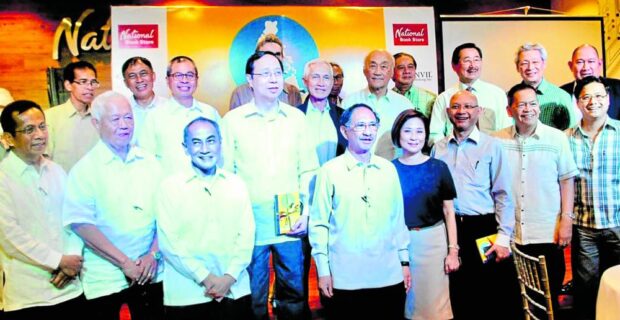FEF bags Templeton Freedom Award anew

CREAM OF THE CROP Some of the country’s brightest and most prominent economists formed FEF in 1997. —Contributed photo
From an informal clique of intellectuals who regularly wined and dined together while brainstorming solutions to the country’s woes, it has evolved into an influential civil society organization that champions economic freedom.
And for espousing free market policy reforms that liberalized foreign investment and competition in key industries in the Philippines, Foundation for Economic Freedom (FEF) won anew the prestigious Templeton Freedom Award at the Atlas Network 2023 Liberty Forum & Freedom Dinner in New York on Nov. 17.
Running annually since 2004, the award honors the legacy of the late fund manager and philanthropist John Templeton and comes with a $100,000 grand prize. It recognizes the most successful projects of the partners of Atlas Network, a nonprofit that advocates economic and personal freedom.
This year’s grand prize was given to FEF in recognition of its “relentless dedication” to amend the Public Service Act (PSA) and the implementing rules and regulations of the Renewable Energy Act. These reforms opened the door to foreign investment and competition in renewable energy, mass transportation and telecommunications.
“These changes give ordinary Filipinos more affordable and reliable access to wireless broadband internet, mass transportation options, and more. And now, renewable energy sources such as solar, wind and tidal energy can help provide electrification in even the most remote areas. In what was previously the world’s third most restrictive country for foreign investment, market competition is already bringing better services and energy access at lower costs for over 100 million Filipinos,” Altas Network says.
This marks the second time that FEF has received this award. The first time was in 2019, when FEF’s efforts contributed to the removal of restrictions on agricultural land patents, unlocking billions of dollars in land values.
FEF board trustee Joseph Angeles, who accepted the award in New York, says the changes in the circa-1935 regulations have been “historic and game-changing.”
Amendments to the PSA, which took effect this year, allowed full foreign ownership of businesses in select industries such as airports, railways, expressways and telecommunications. Prior to this, foreign ownership was limited to 40 percent.
The implementing rules and regulations of the Renewable Energy Act were likewise tweaked to allow full foreign ownership of renewable energy projects, including solar, wind, hydro and ocean or tidal energy resources.
As the Philippines recovers from the effects of the pandemic, Angeles says the economic freedom spurred by these reforms will be crucial in ensuring that a greater majority will have the resources and opportunities to make a good life for themselves and their communities. “We cannot emphasize enough that winning the Templeton Award in 2019 inspired us to become bolder and more ambitious. Winning it a second time will inspire us even more to expand economic freedom in our country and thereby bring better lives to all,” he adds.
Asked what FEF intends to do with the $100,000 cash prize, FEF president Calixto Chikiamco says,” We will use it to finance our continuing advocacies.”
Track record
FEF was founded in 1997 by Chikiamco, Romeo Bernardo, the late Cayetano Paderanga Jr., Felipe Medalla, Mahar Mangahas, Raul Fabella, Simon Paterno, Bong Montes, the late Francis Varela and Alex Magno. They envisioned an organization that could help educate the public and decision-makers on issues of national importance affecting the economy, speak out for good governance and market-friendly reforms and support reformers in government.
The group especially wanted to raise visibility of “orphaned issues” and help counter grandstanding politicians, dogmatic militants and rightist putschists. They recognize that reform takes small steps over a long period and make sure that every position they take is backed by research and empirical evidence. They believe markets work best when institutions function and a rule of law prevails.
“We have, both as an organization and as individuals, weighed in on important issues not always successfully, but always with reason and with passion,” Bernado recalls.
Many FEF Fellows have been in and out of public service over the years. Medalla became a Monetary Board (MB) member and recently retired as Bangko Sentral ng Pilipinas (BSP) Governor, while Eli Remolona is currently the BSP Governor. Bernardo serves as MB member. Rafael Lotilla is Energy Secretary. Arsenio Balisacan became founding chair of the Philippine Competition Commission and is now National Economic and Development Authority Secretary.
Among other members who are incumbent officials are: Philippine Institute for Development Studies (PIDS) president Aniceto Orbeta Jr., PIDS trustee Gilbert Llanto, Justice Undersecretary Geronimo Sy and Energy Undersecretary Sharon Garin.
5 finalists
Backed by the Templeton Religion Trust, the Templeton Freedom Awards Program now grants a total of $270,000 in prizes annually. Aside from FEF, five other organizations across the globe were honored for their contributions to the freedom movement. The finalists, which received $20,000 each, were:
• African Students for Liberty (Africa), which collaborates with nearly 500 active alumni and runs a competitive African Liberty fellowship program that has produced numerous writers and pro-liberty policy analysts who have taken up key positions in government;
• Bikalpa—An Alternative (Nepal), which has brought widespread attention to Nepal’s corrupt motorbike licensing procedures, prompting reforms that slashed waiting time from years to two weeks;
• Foundation for Individual Rights and Expression (United States), which generates support for legal cases centered on free speech and open expression;• Instituto Liberal de São Paulo (Brazil), whose Freedom to Work initiative identifies Brazilian states and municipalities that failed to implement or need to improve the country’s Economic Freedom Law—working with policymakers in those jurisdictions to advance the law’s implementation or enhance current laws to unleash the potential of small and medium enterprises; and,
• Lithuanian Free Market Institute (Lithuania), which provides a multidisciplinary framework for reducing labor migration rules and helping to change the climate of opinion on demographic and labor market solutions in Lithuania.

